In his most candid interview yet, David Crisafulli takes us back to his family home in Ingham, opening up on his upbringing, his political rise and the day he told his family he wanted to be leader.
There’s an old Massey Ferguson 65 on the Crisafulli farm outside Ingham which has such a powerful sentimental value for family patriarch Tony he wouldn’t sell it even if you offered him $100,000.
It belonged to his father, Francesco, who arrived in Australia in 1960 from Messina, Sicily.
Francesco was once described by grandson, state Opposition Leader David Crisafulli, as the “hardest working man I’ve ever met”.
The tiny Massey, still employed in menial duties around the farm but of little practical use, is a precious relic.
It’s a symbol of how swiftly an immigrant family could grasp the opportunities of the new world if its members were prepared to work 15 hour days, seven days a week, save every cent, take a gamble with debt and, in just one generation, turn the grinding poverty of the old country and the rigours of establishing a foothold in the new, into a sentimental curio.
The Massey’s fading red paint is emblematic of an old era of sugar cane production which was dying even when Francesco bought his way into farming in 1972.
Its proximity to expensive 21st century farm equipment including the giant John Deeres, encased by airconditioned cabins and requiring software engineers to service them, is a reminder of just how far this family has come in 64 years.
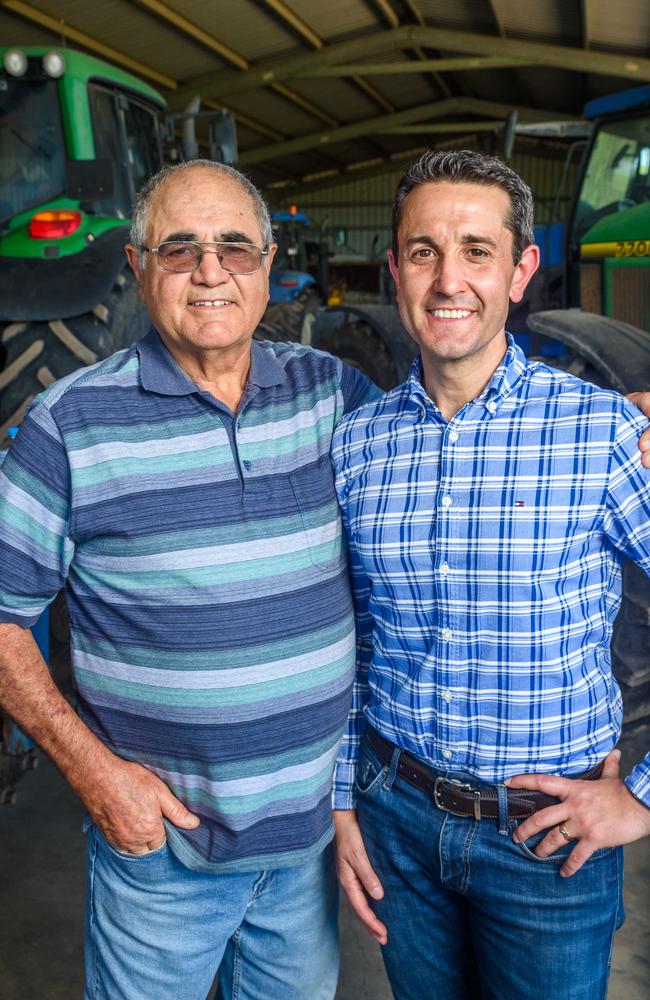
“I think there were three tractors here when Dad bought the farm, but this was definitely one of them, and it’s always been part of the farm and we just wouldn’t sell it,” Tony says.
“What if I offered you a million dollars for it?’’ I say sportingly, and he roars with laughter.
He’s a very funny man, Tony Crisafulli.
Sixty years of backbreaking labour in the north’s sugar cane paddocks could rob a person of a sense of humour, but only seems to have enhanced his capacity to see the comic side of life. He’s delighted by the million dollar offer, and the suggestion implicit within it that everyone can be “bought’’ if the price is right.
One million dollars, he concedes, might be a figure which could prompt him to at least open negotiations on a possible sale of the 65.
He’s sentimental, but not that sentimental. His family’s story is inspiring, but by no means exceptional.
If Tony’s son David, 45, becomes Queensland premier this month, he’ll be the first person of Italian/Sicilian descent to have reached the peak of the state’s power hierarchy.
For those under the age of 30, Crisafulli’s ancestry will mean almost nothing.
For many more senior Queenslanders, even those with only a tenuous grasp of Australian history, his achievement will represent an intriguing and welcome landmark in the evolution of our state, and our nation.
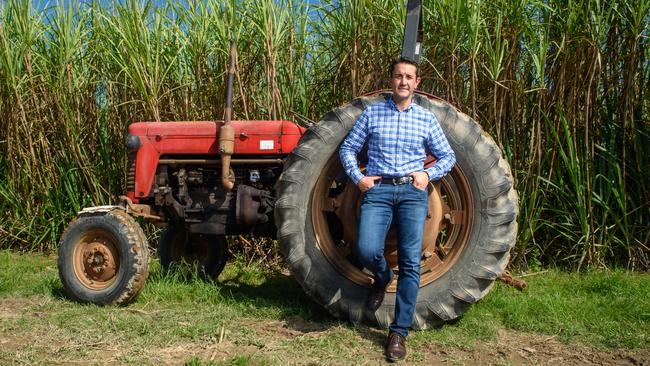
The reality is that when Francesco turned up in Ingham 64 years ago the White Australia policy was still intact, seen by the majority of Australians as a perfectly legitimate tool to keep “non-whites’’ out of Australia, including people from southern Europe. Back then, Australia was so racist it calibrated the hue of skin colour, and tailored its immigration policy to suit.
Labor’s then-immigration minister Arthur Calwell had watered down the White Australia policy after the war, clearing the way for hundreds of refugees from Estonia, Latvia and Lithuania to come in as part of a 1947 resettlement scheme Calwell gormlessly labelled The Beautiful Balts.
It was a marketing catchcry underscoring the more subtle message that their skin was, reassuringly, white. The message was needed because the nation, still guided by the White Australia policy which was passed almost immediately upon Federation in 1901, was by no means putting out the welcome mat to those from the southern Mediterranean.
Many Italians, Sicilians and Maltese had come to Australia before Federation, with a private immigration scheme alone drawing hundreds to the Burdekin, Bundaberg and Ingham in the late 19th century.
Many more came in the 1920s, especially when the United States applied immigration quotas making Australia a viable option.
But, as historian Dr Catherine Dewhirst has rigorously documented, racism was rife against this ethnic group through the first half of the 20th century, and the narrow-minded bigotry was amplified liberally in national media as immigration officials regularly applied the 50-word dictation test to weed out those considered undesirables.
Dewhirst, a senior lecturer in history at the University of Southern Queensland who has studied Italian migration in Queensland, notes that groups such as the British Preference League protested loudly against the Italian dominance in Queensland sugarcane fields, and anyone brave enough to stand up against the bigotry was fair game.
“People defending Italians were frequently called ‘white dagoes’ even as late as 1954,’’
she wrote in an article in the Queensland Historical Atlas.
While many Italians were given assisted passages in the 1960s, it was not until 1966 that the White Australia policy began to be seriously dismantled by the Holt government and, shortly later, the Whitlam government as successive federal governments soon began actively recruiting migrants from across southern and eastern Europe (and later Asia) to settle in Australia.
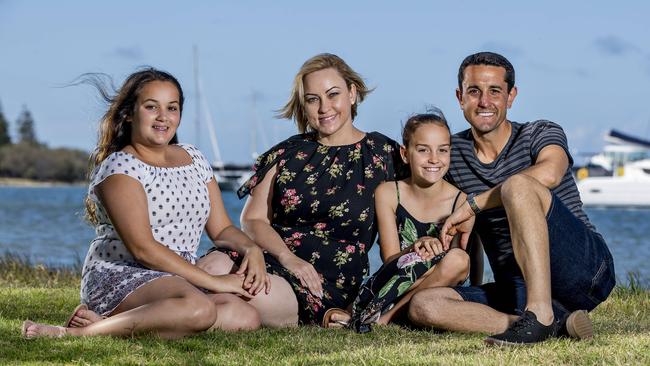
If David Crisafulli wins this month’s election there will be the inevitable media stories of the genre – “who is the real David Crisafulli?’’
He would answer he’s a family man, focused on wife Tegan along with their two daughters, the older, born in 2005, already at uni, and the younger, born in 2007, at high school. The trio are seldom seen with him in public and he doesn’t use his daughters’ names publicly.
Tegan is with him on the farm during our visit and wanders past journalists and photographers to have a chat, but doesn’t bother with the photo opportunities. Yet Crisafulli says his wife immediately said “yes’’ when he told her he was going to run for the LNP leadership in 2020. He had had a quiet few years as Opposition tourism spokesman since returning to state politics in 2017 after having been tossed out of the Townsville seat of Mundingburra in the LNP’s loss under Campbell Newman in 2015 and relocating to Hope Island on the Gold Coast where he was elected to the seat of Broadwater.
“But when I said I wanted to run for the leadership, Tegan and the kids were supportive,’’ he says.
“They’ve always been very supportive of me, but at the same time I’ve always wanted them to have their own lives.’’
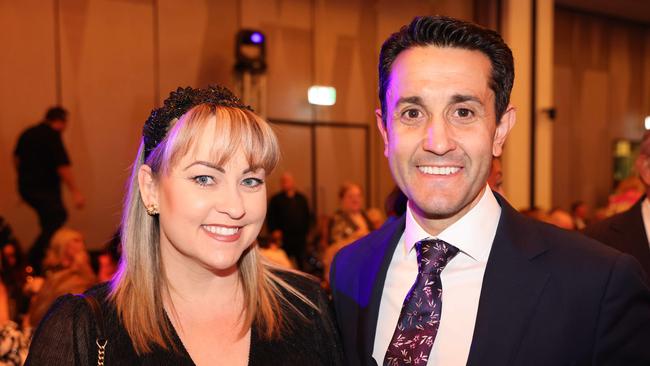
Another identity he readily embraces is the son of a migrant (Tony came out from Sicily in 1961 as a kid nearly one year after Francesco arrived) and, more broadly, a grandchild of Australia’s post-war immigration boom.
He’s always been deeply attached to this farm (he owns part of it) as well as to Tony, his mother Karen, who is of Italian descent, and a wider extended family as well as his paternal grandparents, Francesco and Giuseppa who have long since passed away but whose humble home remains on the property, the custodian of some of David’s most treasured childhood memories.
It was on the concrete slab under the house that the family celebrated Christmas with Francesco and Giuseppa in the sweltering North Queensland heat.
Crisafulli can still reel off from memory the sweet Sicilian dishes his grandmother would make and how the ageing couple brought the magic of Christmas alive.
“They are still among my happiest memories,’’ he says.
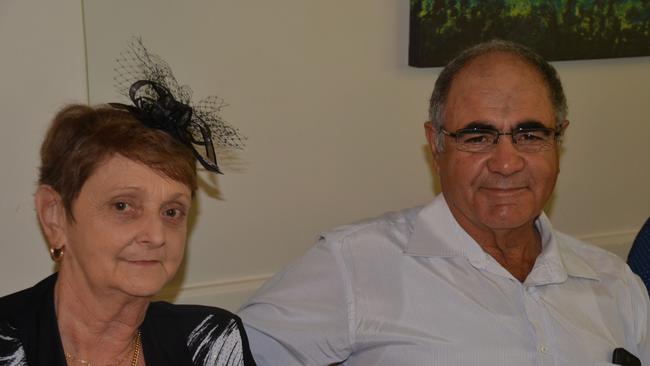
Asked what lessons his ancestry has taught him, he replies without equivocation – “hard work”.
“I get out of bed every morning well before the sun,’’ Crisafulli says. “I think that even my harshest critics would acknowledge that I work hard, and I am very disciplined. Those characteristics are important to me.”
His migration origins, he says, cross ethnic lines and are almost “the story of Queensland”.
“I look at the migration story of cultures through different eras, and they all come to a country with nothing more than a hope for the next generation.
“Look at the Vietnamese of the mid-1970s, the Chinese and the Indians – I meet an Indian guy and I ask him about himself and his great cry is, ‘My daughter is studying medicine and my son is studying engineering!’
“Like, I just love that, this is the land of opportunity that is what’s great about Queensland, this is what is great about Australia.’’
Crisafulli’s story is repeated literally thousands of times in households along Queensland’s east coast, from Maryborough to Mossman.
It was in these sugar towns that the Italians, Sicilians and Maltese hopped off a boat, picked up a cane knife, shrugged off the “wog’’ insults and began slashing their way through their usually Anglo-Saxon employer’s sugar cane paddock.
Within a handful of years many of them were materialising on the veranda of the farmhouse, clutching a cheque book and indicating to the owner, in their still halting English, that they were in a position to buy not merely the paddock, but the entire farm.
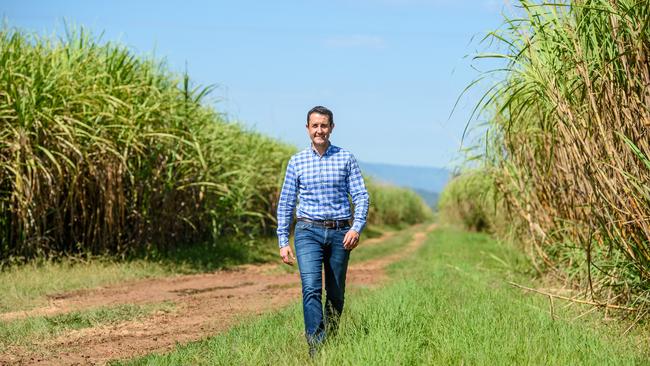
They’ve proved themselves perhaps Australia’s most successful class of immigrants, the masters of that multiculturalism which they absorbed without any instruction from Whitlam era immigration minister Al Grasby who introduced the concept to the nation.
Released from the stifling class structures of old Europe, Australia gave them free rein to manifest their talents, and they’ve never stopped expressing their gratitude for the opportunities this country presented to them.
Tony Crisafulli alone is a stunning success story, building his first investment in his father’s modest farm into own empire before he reached the age of 20.
He now oversees a series of farms around Long Pocket outside Ingham, cutting 40,000 tonnes of cane a year, a millionaire several times over, at least on paper.
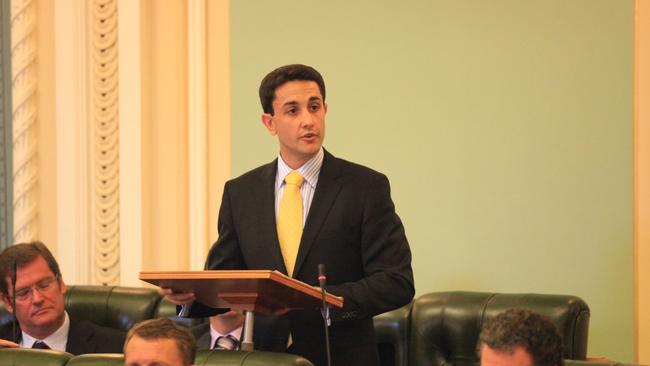
His brother Sam started working life as a sugar mill apprentice, went to James Cook University and the Australian National University, got a doctorate in systems engineering and created a company he sold for a small fortune. He now lives in America where one of his boys is in an elite unit within the United States military.
None of their success, including the extraordinary political career of this third generation scion David who will possibly be Queensland’s 41st premier, was possible back in Sicily where a crumbling but still partially intact aristocracy occupied the top tiers of society.
“You see, where we came from, we were downtrodden, like you had to work the ground,” Tony says, clasping his hands together and swinging them up and down to illustrate digging with a hoe.
“There was the titled class, then there was the rest.
“On a lease on a share farm, Dad got 20 per cent and the owner got 80 per cent and he (the owner) never even set foot on the farm.”
“You could not eat, you could not live.”
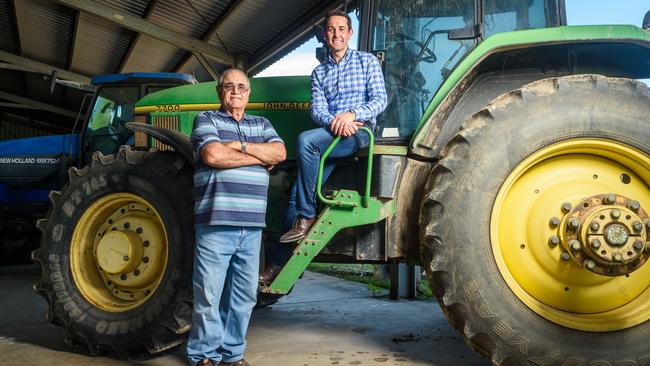
Australia changed all that, and the result today is still evident in the thousands of successful families residing throughout regional Queensland.
Paul Schembri who served nearly a decade as (peak industry group) Canegrowers chairman before retirement in 2022 is one of the breed.
He knows the Crisafulli family well, calling Tony a “mate”.
“I have always admired them, they are wonderful people,” he says of the Crisafulli family.
Schembri’s ancestors managed to immigrate at the height of White Australia and established the family farm in Farleigh just north of Mackay in the late 1920s.
Many ethnic groups contributed to the success of the state’s sugar industry, not least the South Sea Islanders who were brought in (there are credible claims many were kidnapped and effectively enslaved) during the 19th century to work in the paddocks. But Schembri agrees there is no contest that the Italians, Sicilians and Maltese made a major contribution to the ongoing vitality of the Queensland sugar industry.
As for their habit of sticking with the bragioli (stuffed beef rolls) and leaving the pie and curried sausage to the Australians, Schembri says there will be no apology.
This cohort almost universally embraced their Australian identity the moment the boat hit an Australian pier, but saw no problem in keeping their taste in wine, food and, in many instances, fashion.
”We wrote the book on multiculturalism,’’ he says.
“My grandmother was from Malta and she always made it very clear to us kids – never forget your origins, but you are an Australian first.”
Hard work, Schembri says, was always the key ingredient to success for an immigrant family, and there is possibly no harder work on earth than cutting sugar cane.
Likened to running a half marathon every day of your working life, the challenge of daily cane cutting is almost impossible to comprehend in the mechanised and highly regulated world of modern labour.
Waking before sunrise, cane cutting gangs would spend the day under a tropical sun, bent at the waist and furiously wielding a small machete while wading through snake infested land where swamp fever (leptospirosis which killed more than a few of them) lurked.
The money could be extraordinary, as much as three or even four times the average wage, and the “guns” were lauded as local heroes in much the same way regional football stars are today.
But there was no room for weakness. When the harvest was on, no one was permitted to slacken the pace and new recruits who developed blisters on their hands were told by seasoned cutters to “piss on them and keep cutting”.
It wasn’t an insult. There was a deep and abiding belief in many of the gangs that the urine toughened up the skin on the hands and prevented blisters developing.
Tony Crisafulli may have been wary of their approach to preventive health care, but he and his father could keep up with these men.
He wasn’t a gun but he could hold his own in the paddock and distinctly remembers having an accident in the field when he was aged no more than 13, slashing himself with the knife.
”I knew if I told Dad he would be upset and he would have sent me home,” Tony recalls.
“So I picked up some dirt, rubbed it in, (to the wound) stopped the flow of blood and kept working.”
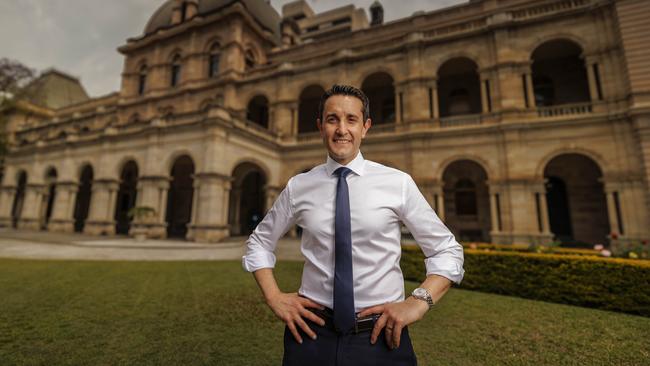
Son David readily acknowledges he hit the ancestral jackpot by arriving in the third generation.
Life on a sugar cane farm can still be hard work, but mechanisation had kicked in by 1979 when David Crisafulli was born and the Toft and the Don Mizzi harvesters were gliding down the drills, doing the work of 100 hand cutters in a day.
He had an idyllic childhood in what would have to rate as one of the more beautiful locations on the planet.
The blue Herbert River flows behind the Crisafulli’s main farmhouse and the world-renowned Wallaman Falls are just a few kilometres away.
As he entered his teenage years, he began toying with life beyond the farm and a career in journalism.
He took an off-farm job at the Coles deli in Ingham to earn some pocket money before heading off to James Cook University to study journalism in 1997.
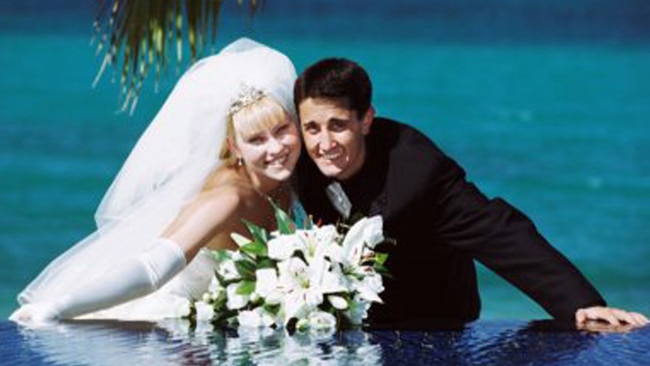
Then he carved out a successful career in print and television in Townsville before deciding to become a local government politician when he and Tegan bought a house in the city when they were barely into their 20s and Crisafulli, looking at his rates bill, decided he wanted a better deal when it came to rates, roads and rubbish.
He was Townsville’s deputy mayor by 2008.
Yet there was no escaping at least a taste of that hard physical labour previous generations had to endure to give him the good life. He distinctly remembers the year he turned 16 when he and his father worked some new land opening up at Stone River but requiring clearing before cultivation.
They were pulling up tree roots from the soil, placing them in a pile and burning them when Tony stepped into a smouldering pit of ash.
David Crisafulli’s face still contorts into an involuntary grimace when he remembers the sight of the blistered skin on his father’s foot.
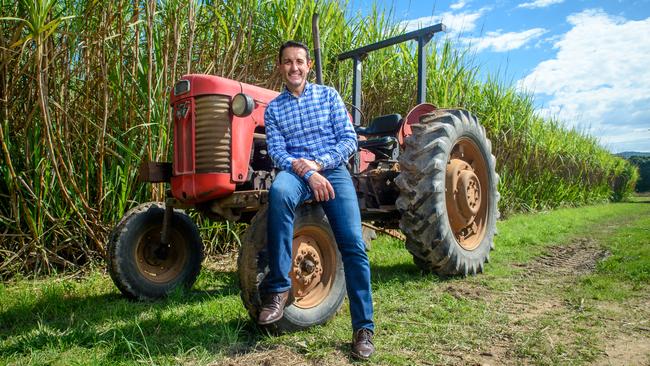
Yet, as they both recall the incident over cold soft drinks on the back porch of the farm house, it seems instructive on the ongoing influence of their ancestry that neither can recall if Tony sought immediate medical treatment.
Certainly, no one called an ambulance.
“I am pretty sure he ended up at a doctor a few days later and they dressed it, and he went back to work,” David says.
He still recalls that summer of 1995 as the hardest period of sustained physical labour he has ever endured in his life.
“Did the old man pay you?” I ask.
“Yes,” he replies.
“He gave me the lessons in life I badly needed.”

Add your comment to this story
To join the conversation, please log in. Don't have an account? Register
Join the conversation, you are commenting as Logout
‘Smoke and mirrors’: The ‘24 hour’ hospital with no doctor
Sick enough to need hospital-level care, a Qld woman went to her local emergency department but was instead forced to seek help through telehealth because no doctors were on the ground.
Boat ramp, cuts to barge fares, road gridlock tackled: state budget
Redland and Logan residents face soaring rates and rising taxes and this year’s state budget offered little in return beyond barge fare relief and recycled projects.